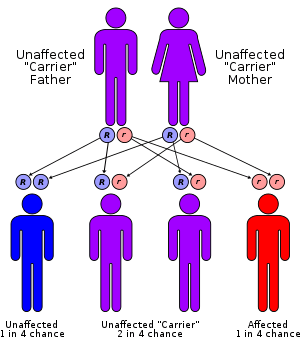Lucey–Driscoll syndrome
| Lucey–Driscoll syndrome | |
|---|---|
| Synonyms | Transient familial neonatal hyperbilirubinemia |
 | |
| Lucey–Driscoll syndrome has an autosomal recessive pattern of inheritance. | |
| Specialty | DiseasesDB = 32677 |
Lucey–Driscoll syndrome is an autosomal recessive metabolic disorder affecting enzymes involved in bilirubin metabolism.[1] It is one of several disorders classified as a transient familial neonatal unconjugated hyperbilirubinemia.
Cause
The common cause is congenital, but it can also be caused by maternal steroids passed on through breast milk to the newborn. It is different from breast feeding-associated jaundice (breast-fed infants have higher bilirubin levels than formula-fed ones).
Genetics
A defect in the UGT1A1-gene, also linked to Crigler–Najjar syndrome and Gilbert's syndrome, is responsible for the congenital form of Lucey–Driscoll syndrome.
References
- ↑ "Lucey-Driscoll syndrome | Genetic and Rare Diseases Information Center (GARD) – an NCATS Program". rarediseases.info.nih.gov. Retrieved 2017-08-27.
External links
| Classification | |
|---|---|
| External resources |
- Online Mendelian Inheritance in Man (OMIM) 237900 - transient familial neonatal hyperbilirubinemia, breast feeding jaundice included
This article is issued from
Wikipedia.
The text is licensed under Creative Commons - Attribution - Sharealike.
Additional terms may apply for the media files.